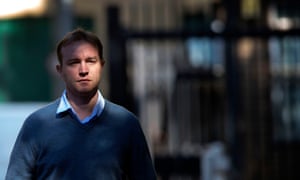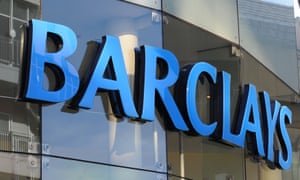Barclays is not only facing an investigation into chief executive Jes Staley’s attempts to unmask a whistleblower from UK regulators.
The Department of Financial Services in New York is also looking into the matter, according to Bloomberg.
City trader Tom Hayes, the first person convicted of rigging Libor and serving an 11-year sentence, has issued a statement on the BBC story that the Bank of England put pressure on banks to lower their rates:
The involvement of the Bank of England in lowballing Libor was a key plank of my defence. The prosecution did not give me the evidence I needed to prove it and my jury were misled. It is my view that there should be an urgent public inquiry into the real Libor scandal: where central banks, politicians and the British Bankers’ Association colluded to get artificially low Libor rates. Traders like me should not be in prison – we were only requesting Libor submissions that reflected market conditions. I have now been in a high security prison for over 18 months but I swear that I did not know that requesting Libor rates that benefitted my bank but which also reflected the market was wrong.

Hayes Photograph: Bloomberg/Bloomberg via Getty Images
So far this latest run-in with the regulators has not had much effect on Barclays share price. It is down just 0.2% at 214.85p.
Regulatory fatigue? Or do investors believe a severe reprimand for a FTSE 100 chief executive and a subsequent bonus cut – an event rare as hen’s teeth – is nothing much to worry about? Or is everyone off on their Easter break?
Barclays says that in the wake of its chief executive Jes Staley’s attempts to track down the whistleblower “a very significant compensation adjustment will be made to Mr Staley’s variable compensation award.” My colleague Julia Kollewe has crunched the numbers:
Jes Staley received a total pay package of £4.2m last year including an annual bonus of £1.3m (60% of his maximum bonus opportunity for the year). For this year, he is in line for an annual bonus of up to £1.88m and another bonus under the long-term incentive plan of up to £2.82m, on top of his annual fixed pay, which amounted to £2.35m last year.
Updated
Bank of England pressured banks on libor rates – BBC
The Bank of England may be relieved that Barclays’ woes have taken some of the attention away from new claims it had interfered with the setting of libor rates – which tracks how much it costs banks to borrow from each other.
A BBC Panorama report claims a secret recording shows the Bank repeatedly put pressure on commercial banks to push their libor rates down during the 2008 financial crisis. The BBC story is here.
This is a problem Barclays could have done without after its host of regulatory issues, but removing Staley from his post could set back its attempts to revive the business, says analyst Gary Greenwood at Shore Capital:
Given Barclays’ history of regulatory misdemeanours, most notably the high profile investigation into Libor rigging which led to former CEO Bob Diamond’s departure from the group, this latest revelation represents a very significant embarrassment for the Board as it tries to rebuild the group’s reputation.
As for Mr Staley, it remains to be seen whether the PRA and FCA come to the same conclusion as the Board in allowing him to remain in his post, although we would assume that the sanctions proposed will have already been discussed with the regulators and should therefore help to mitigate this risk. It is possible that the group may also be fined by the regulators.
Operationally, we believe that Barclays has made excellent progress under the stewardship of Jes Staley, notably in respect of running off non-core assets and rebuilding the capital base. To remove Mr Staley from his role at this juncture would be damaging to further operational progress, with an improvement in return on equity now the key area of focus. While Mr Staley’s reputation has undoubtedly taken a serious knock, we believe that it remains in the best interests of shareholders to keep him in the post of CEO and hence we recommend that they follow the Board’s direction and vote in favour of his reappointment at the AGM in May.
Barclay’s boss Staley apologises
Staley said:
I have apologised to the Barclays Board, and accepted its conclusion that my personal actions in this matter were errors on my part. I will also accept whatever sanction it deems appropriate. I will cooperate fully with the Financial Conduct Authority and the Prudential Regulatory Authority, which are now both examining this matter.
Our whistleblowing process is one of the most important means by which we protect our culture and values at Barclays and I certainly want to ensure that all colleagues, and others who may utilise it, understand the criticality which I attach to it.
The whole thing started in June 2016 when the bank’s board and a senior executive both received anonymous letters about a senior executive who had been recruited earlier in the year. Barclays said:
Amongst other issues, the letters raised concerns of a personal nature about the senior employee, Mr Staley’s knowledge of and role in dealing with those issues at a previous employer, and the appropriateness of the recruitment process followed on this occasion by Barclays.
When he found out about the letters, Staley attempted to find out who had written them. The bank said he “honestly, but mistakenly, believed that it was permissible to identify the author of the letter.”
He asked the bank’s Group Information Security (GIS) team to investigate and GIS contacted a US law enforcement agency for help.But to no avail, and the whistleblower was not identified.
The board found out about Staley’s actions as “a result of a concern raised by an employee regarding amongst other matters the adequacy of Barclays whistleblowing procedures.”
After its own investigation into Staley’s actions Barclays says it “ accepted his explanation that he was trying to protect a colleague who had experienced personal difficulties in the past from what he believed to be an unfair attack, and has accepted his apology.
“Taking into account both the circumstances of this matter and his otherwise exemplary record since joining Barclays, including contributing significantly to improvements in Barclays culture and controls, Jes continues to have the Board’s unanimous confidence and it will support his re-appointment at Barclays Annual General Meeting on 10 May 2017.”

Barclays in whistleblower row Photograph: Joe Giddens/PA
Updated
Barclays says it will co-operate with the investigation by the regulators, and will also review its whistleblowing processes.
The banks’ chairman John McFarlane, said:
I am personally very disappointed and apologetic that this situation has occurred, particularly as we strive to operate to the highest possible ethical standards. The Board takes Barclays culture and the integrity of its controls extremely seriously. We have investigated this matter fully using an external law firm and we will be commissioning an independent review of Barclays processes and controls to determine what improvements may be required.
Agenda: Banks in focus on whistleblowing and Libor
Good morning, and welcome to our rolling coverage of the world economy, the financial markets, the eurozone and business.
It’s a quiet day on the economic and results front but not for the banking sector, albeit in a way which does it no favours.
The Bank of England has again been embroiled in the never-ending Libor scandal (more in a moment), but first over to Barclays.
The bank and its chief executive Jes Staley are being investigated by regulators over his attempts in 2016 to unmask a whistleblower who had written to express concerns about a recently recruited senior executive.
Barclays said Staley’s attempt to identify the whistleblower came to its attention in early 2017 and it started an investigation by law firm Simmons & Simmons, and also told the regulator the Financial Conduct Authority (FCA) and the Prudential Regulation Authority (PRA).
Staley said he “honestly but mistakenly believed that it was permissible to identify the author of the letter.”
It plans to formally reprimand Staley and will cut his compensation payment by a “very significant” amount.
Updated
